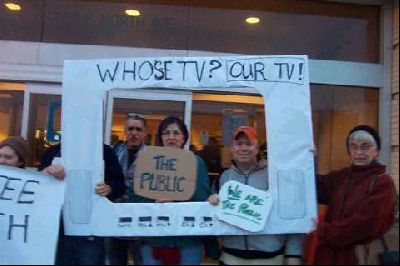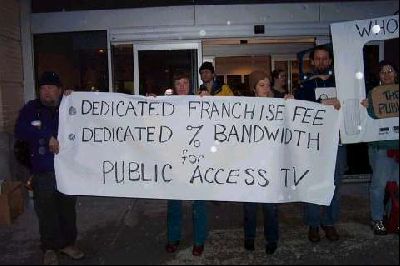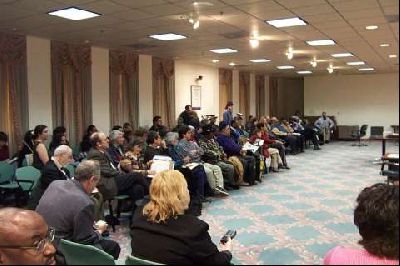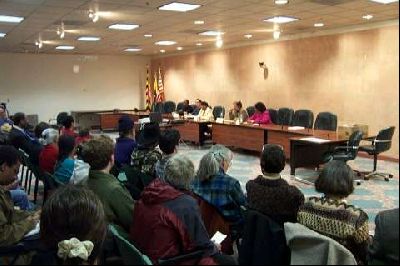Baltimore IMC : http://www.baltimoreimc.org
Commentary :: [none]
Fleeting Public Access TV Opportunity
Baltimore City is quietly soliciting the people's opinions about Public Access TV, and among other things, the people are saying loudly, "We want part of the 5% monopoly franchise fee to be dedicated to funding Public Access TV."

Supporters of Baltimore Public Access TV chant "Whose TV? Our TV" at a March 30, 2004 hearing.
Projecting the People’s Voice on Public Access TV
Did you know that the 20-year contract that allows Comcast a monopoly on cable access in Baltimore is being renegotiated? Don’t feel bad if not, because most people don’t. As a privilege of having this monopoly in an industry that has huge profit margins, some have said 40% though it’s hard to believe, the cable company must pay a 5% franchise fee to the City. In many cities and counties those fees are dedicated to the support of public access, educational, and government TV systems (PEG). On Tuesday, March 30, 2004, the City organized a listening session, or hearing, or something, to gauge the people’s support for PEG, though most people focused on the “P” in PEG, that is, Public Access TV.

Supporters demand that a portion of the 5% cable monopoly franchise fee be dedicated to supporting a vibrant Public Access TV system. They also demand that a percentage of the bandwidth, which will grow as technology improves, be dedicated to Public Access.
In theory, under federal laws that govern monopolistic cable companies, Public Access TV allows the community to access to the cable system. People can develop their own programming and sponsor existing programming, such as the popular Democracy Now! with Amy Goodman, to be shown over their cable system (when the community allows a natural monopoly, it is fair to say the system is theirs). In practice, this only works well when a portion of the cable company’s 5% franchise fee is dedicated to the “P” in PEG. In Baltimore, it doesn’t work well, in great degree because we do not have a dedicated stream of funding. It does work well in Carroll County, Howard County, the District of Columbia, but they had to fight for dedicated funding, and that fight is beginning to smolder in Baltimore.
In an effort to blow on that smoldering heap of confusion, about 100 people showed up at the North Avenue Education Building last Tuesday to voice their opinions. Some of those people came carrying signs and visual props, in an effort to gain some mass media attention to this fleeting opportunity
(See Video link for WBAL Ch11 Coverage). The opportunity is fleeting because it seems the City would like to get the contract in place quickly, without a fuss, and without having to dedicate part of the 5% franchise fee for Public Access TV. You see, the City has mismanaged its educational funds and, rather than providing the people a vibrant voice via their cable TV system as is done in other cities, Baltimore City would like to quietly use the cable franchise funds elsewhere. The cable contract could be for as long as 20 years, implying that once it fleets by, it will have fleeted for a long time. As you can imagine, those people who realize what’s at stake were somewhat passionate at this hearing.
Impressions of a Baltimore City Public Hearing
It took me about five minutes before I figuratively removed my press pass. Forget the “who, what, where, and why.” Picture a long rectangular board meeting room. About 100 people are filling all the seats on one side of the room. Across the room, at a considerable distance from "the people" and seated behind an long table, was "the Board." Well, maybe they weren=t a Board--they were a mix of citizen advisors, who admitted they had no real power, and Marilyn Harris-Davis, Director of the City’s Office of Cable and Communications. One wonders if she has any power, or if it resides with the monopoly cable provider Comcast. Each Board member had a microphone, and one mic was available to the people. But there was a slight problem with the people’s mic. The mic was placed at a right angle at the end of the Board table so that when a commentor from the audience came up to speak, they had to sit at a right angle to the audience. On my side of the room, we had only a rear view of the commentors. Small detail? Sure. The sum of the meeting was in the details, and the details made it clear who was the elite and who was the hoi poloi.

We all were there for what was the first and maybe last hearing for public comment on the pending renewal of the Comcast cable company=s contract with the city of Baltimore. The primary issue was how much of the money paid by the company to the City would be allowed for public access television. "The City wants strong financial support of Public Access," Marilyn Harris-Davis said in her opening remarks. It was the first of many tendentious remarks that were to cloud the evening's discussion.

Marilyn Harris-Davis, Executive Director of the Mayor's Office of Cable and Communications, chairs the March 30, 2004 hearing on the cable TV contract being negotiated with Comcast Corp.
"We need to know," she said, "that the people of Baltimore want community access." I am not quite sure why that's the case, but is was clear that calling a poorly publicized meeting, with little notice and no plans for future meetings, was not the way to find out what the people wanted. She justified her remarks by noting that Public Access TV will give "Baltimore access to free speech." I mean the meeting had hardly begun and the bureaucratic detritus was already filling the room.
So we could see an example of community-produced programs (I think that was what we were supposed to see) the board arranged to show us a video of how well the Public Access TV works in the District of Columbia. Unfortunately, they had transferred the video to a CD on a laptop computer, but couldn’t get the audio to play without nasty feedback. This is the City Office that responsible for communications?
The meeting was opened to the audience with each person being allowed two minutes to present their views. Most of the comments were pointed and on target. The self-aggrandizing and the usual verbose people who spoke well-beyond their competency were there but in small numbers.
Here are some of the issues that were presented:
+ The process was moving too fast. It appeared that "someone" wanted to award the contract by the end of April and not call for any further public input.
+ Money from the 5% franchise fees paid to the City needs to be set aside for a public access channel as distinct from an education and a government channel. This is done in other cities with vibrant public access TV, but Baltimore has been putting that money into the general fund, which then vanishes into the ether, while public access TV enthusiasts are left to fight among themselves.
+ A separate amount of funding should be allocated for capital expenses and maintenance. This should support a number of studios across the City, as well as a mobile studio, and other equipment.
+ The cable company should also provide internet access for the community.
+ There should be a democratic process for oversight for selecting and scheduling programming.
+ A community representative should be directly involved in the negotiations with Comcast.
+ A community representative should be directly involved in managing the station, which at present is being run by the City in violation of the law. We’re advised not to make a fuss lest the City decides it will pull the plug on public access TV all together.
Many of the speakers were clearly unfamiliar with Public Access TV and cable, but felt the need for public access, especially for the arts and politics, which was clearly articulated. Many were quite concerned with the amount of money that would be allocated. When the board was asked specifically about the amounts involved, as well as other details, Harris-Davis said Awe need to ask our attorney.@ When asked about the details of the negotiation again, she vocalized the cry of the smiley-faced bureaucrat, "trust me." One speaker brought down the house when he commented "I know the city, they smile in your face and then cut your throat." The natives were getting restless. Fortunately time was up…. for the hearing; however, there is still time for your voice to be heard, if you invest a little time in providing written comments.
Guidance for Developing Written Comments
1. Insufficient notice of the hearing was given to the public by Baltimore City. A second public hearing should be scheduled to fairly gauge the people's interests in Public Access TV.
2. The public comment period on this first and possibly last public hearing should be extended for another 60-days beyond the closing date.
3. Dedicated Funding: Public Access TV should receive at least one-fifth of the 5% cable franchise fee that the City now puts in the general funds. The contract should require that additional funds be set-aside annually to support studio space and equipment. These are common provisions in contracts in most other cities and counties across the nation. (See Public Access Internet below).
4. The contract should provide Public Access TV with a percentage of the band width, not just a single channel. As technology improves, and band width increases, we want the public access band width become greater too.
5. We want a provision in the contract to ensure that "Public Access" will include "Public Access Internet" if it is technically viable. We want the cable company to fund the capital costs, maintenance, and upgrades of a public access internet service separately from the franchise fees.
6. If the City is going to give a sole source contract to Comcast, the contract period should be for no more than 10-years. Most cities have bidding open to competition, but we're willing to look the other way on this if the contract period is short.
Send written comments to:
Ms. Marilyn Harris-Davis
Executive Director,
Mayor's Office of Cable and Communications
City Hall
Room 250
100 N. Holliday Street
Baltimore, Maryland 21202
e-mail: cable21 (at) mail.ci.baltimore.md.us
Views
Information
Search
This site made manifest by dadaIMC software

